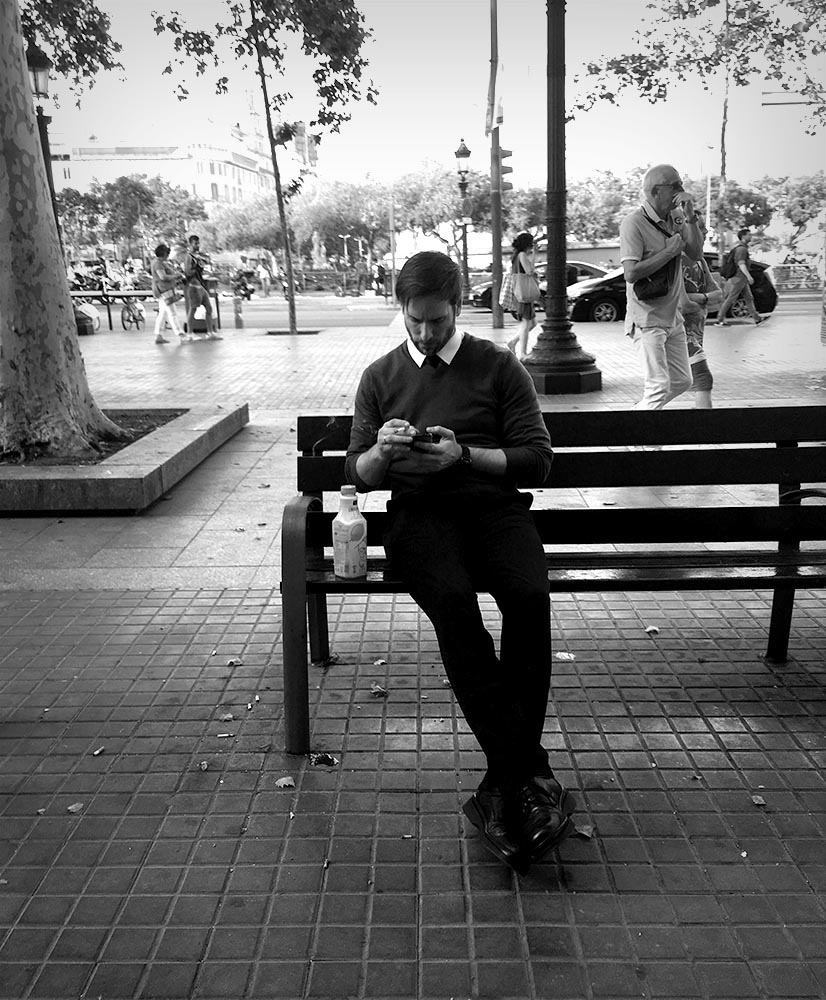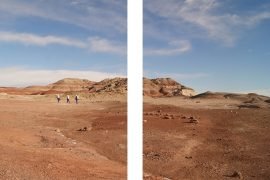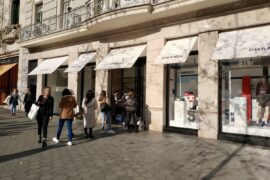[dropcap letter=”T”]
he sun is shining gently on coat-clad passersby rushing in and out of shops and cafés. On this particular November day, the temperature is a mild 18 degrees and the sky above Barcelona does not show a single cloud. Squeezed between the terraces of two of the city’s many bars is the entrance to one of the city’s numerous co-working spaces. Its interior is kept in trendy industrial chic; the space’s wood and steel furniture littered with empty coffee cups while comfy-looking sofas and endless cables spread out in front of naked stone walls and underneath metal pipes on the ceiling. Young people in trendy clothes sit hunched in front of MacBooks, wearing huge and colourful noise-swallowing earphones.
Coworking spaces like this one are found all over the city of Barcelona, set in spacious beautiful buildings in the central Eixample district, wedged between tiny houses in trendy Gracia or shaping the face of start-up hub Poblenou. There are presumably around one hundred of these offices in the coastal city, catering to the worldwide trend of gig economies and location independent entrepreneurs and remote workers who basically only need a good Wi-Fi connection in order to do their jobs. Plenty of online guides for digital nomads also suggest the best meetups or accommodation for digital workers in Barcelona – many of whom arrive here because life in the Mediterranean city seems easy-going and enjoyable.
“Barcelona is one of the better cities for digital nomads, especially if you’re European and you want to stay close to home, in the same time zone and during the winter”, the digital nomad Johnny Jen says
One of the digital nomads, who worked and lived in Barcelona for some time, is Johnny Jen. The American known as JohnnyFD has been traveling the world for the past ten years, building up different streams of income to finance his lifestyle. Among other projects, Jen started the annual digital nomad conference Nomad Summit. Last year, he spent a couple of months in Barcelona, seduced by the reputation the city has. “Before I visited Barcelona, I was thinking it may be one of the few places, where I could live all year around”, he recalls.
According to Jen, the metropolitan city has many of the qualities a digital nomad needs to have a good experience. One of them is good weather and Barcelona with its warm summers and mild winters is considered a good spot. “Barcelona is one of the better cities for digital nomads, especially if you’re European and you want to stay close to home, in the same time zone and during the winter”, Jen says. “Then it’s a great place to be.” Naturally, fast and reliable internet connections and a good infrastructure are also important. It should be easy to get around the city and have an airport that has convenient connecting flights to major cities in Europe or other digital nomad destinations like Bali or Chiang Mai. “Barcelona is one of the few places in the world that has good connecting airport, good infrastructure, good Wi-Fi, good weather and a beach”, Jen concludes.
“Importantly, it has an international community”, he says. “It is easy to meet new people; friends, coworkers and interesting business contacts”, Stuart Jones says
Remote workers like Jen also profit from communities with like-minded people, either for joint projects, to exchange ideas or just because working from home can get lonely sometimes. Apart from many coworking spaces, the city also offers a variety of tech events, ranging from the renowned annual Mobile World Congress to small freelancer networking meetups. Stuart Jones, founder of the Barcelona-based company Coworkation, a provider of working holiday for digital nomads, also sees the Catalonian capital as a good destination for remote workers. While currently being back in his home country Australia, Jones spends a few months a year in Barcelona. “Importantly, it has an international community”, he says. “It is easy to meet new people; friends, coworkers and interesting business contacts.” Like in many places with a lot of travellers, people in Barcelona are open to meeting others, making it easy to make connections.
It is really hard and really expensive to find accommodation, especially midterm accommodations”, Jen knows. “As digital nomads, we normally rent between one and three months at a time and aside from Airbnb there were really no options for that.”
While the Catalonian capital has many advantages for digital nomads, it also poses great difficulties for some. Life in Barcelona can still be relatively cheap compared to other European cities, but rent prices have increased by 35 per cent since 2010 according to media reports and finding a place to live has become a painstaking process, with people having to pay thousands of Euros just to move into a new flat. “It is really hard and really expensive to find accommodation, especially midterm accommodations”, Jen knows. “As digital nomads, we normally rent between one and three months at a time and aside from Airbnb there were really no options for that.”
After arriving in Barcelona, Jen’s friend spent one week looking for a place to live as if it was her full-time job, he recalls. Demands by locals, tourists and expats are high – and so are the prices. “Barcelona still attracts established start-ups as well as high-end marketers who make a lot of money”, Jen says, suggesting that Barcelona is losing its spot as top destination for digital nomads because people who start up their businesses cannot afford to live in the city. On Nomadlist, an information website that collects and ranks data about potential locations for remote working, the Catalan city only ranks tenth, behind Medellín (Colombia) or Berlin (Germany).





















